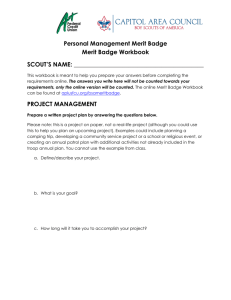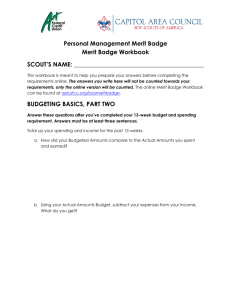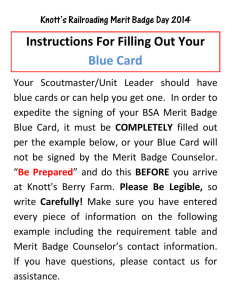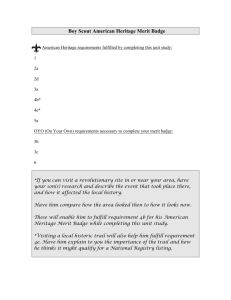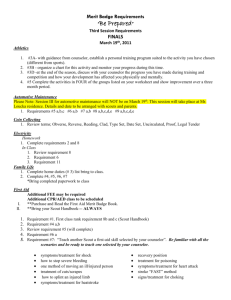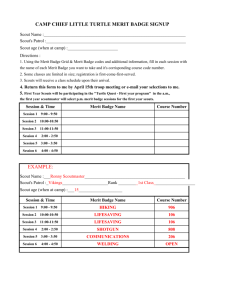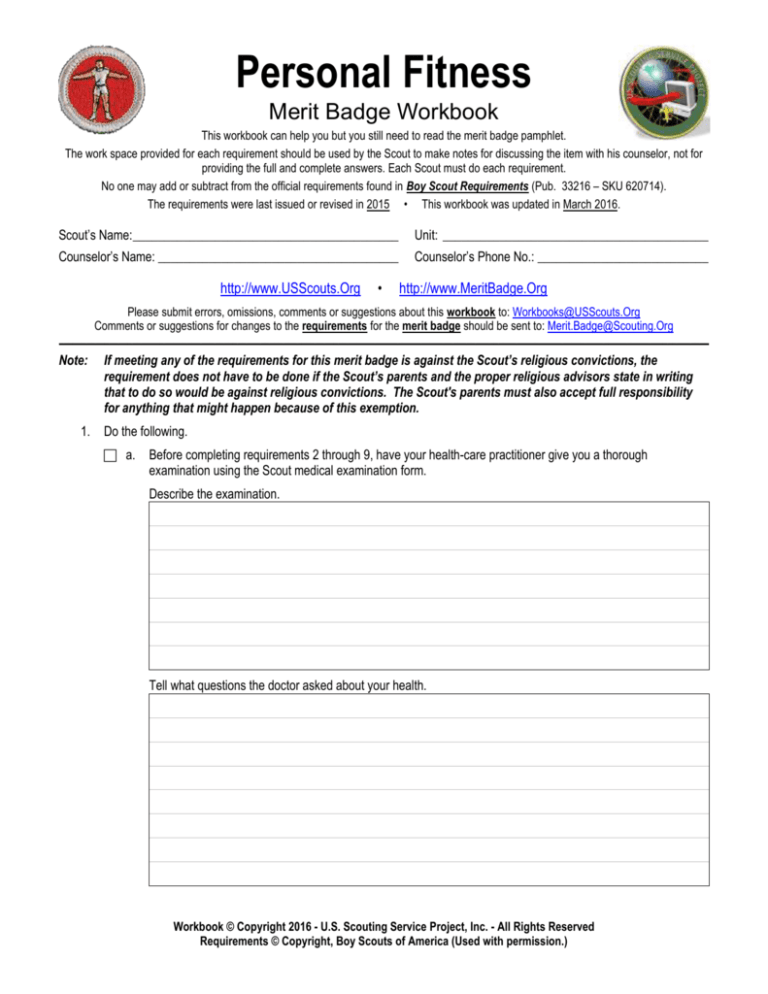
Personal Fitness
Merit Badge Workbook
This workbook can help you but you still need to read the merit badge pamphlet.
The work space provided for each requirement should be used by the Scout to make notes for discussing the item with his counselor, not for
providing the full and complete answers. Each Scout must do each requirement.
No one may add or subtract from the official requirements found in Boy Scout Requirements (Pub. 33216 – SKU 620714).
The requirements were last issued or revised in 2015 • This workbook was updated in March 2016.
Scout’s Name:__________________________________________
Unit: __________________________________________
Counselor’s Name: ______________________________________
Counselor’s Phone No.: ___________________________
http://www.USScouts.Org
•
http://www.MeritBadge.Org
Please submit errors, omissions, comments or suggestions about this workbook to: Workbooks@USScouts.Org
Comments or suggestions for changes to the requirements for the merit badge should be sent to: Merit.Badge@Scouting.Org
______________________________________________________________________________________________________________________________________________
Note:
If meeting any of the requirements for this merit badge is against the Scout’s religious convictions, the
requirement does not have to be done if the Scout’s parents and the proper religious advisors state in writing
that to do so would be against religious convictions. The Scout's parents must also accept full responsibility
for anything that might happen because of this exemption.
1. Do the following.
a.
Before completing requirements 2 through 9, have your health-care practitioner give you a thorough
examination using the Scout medical examination form.
Describe the examination.
Tell what questions the doctor asked about your health.
Workbook © Copyright 2016 - U.S. Scouting Service Project, Inc. - All Rights Reserved
Requirements © Copyright, Boy Scouts of America (Used with permission.)
Personal Fitness
Scout's Name: ________________________
Tell what health or medical recommendations the doctor made and report what you have done in response to
the recommendations.
Recommendations:
Response:
Explain the following:
1. Why physical exams are important
2. Why preventive habits (such as exercising regularly) are important in maintaining good health, and
how the use of tobacco products, alcohol, and other harmful substances can negatively affect our
personal fitness.
Why preventive habits are important:
Effect of tobacco products, alcohol, and other harmful substances:
Personal Fitness - Merit Badge Workbook
Page. 2 of 14
Personal Fitness
Scout's Name: ________________________
3. Diseases that can be prevented and how
4. The 7 warning signs of cancer:
1.
2.
3.
4.
5.
6.
7.
5. The youth risk factors that affect cardiovascular fitness in adulthood
b.
Have a dental examination. Get a statement saying that your teeth have been checked and cared for.
Tell how to care for your teeth.
Personal Fitness - Merit Badge Workbook
Page. 3 of 14
Personal Fitness
Scout's Name: ________________________
2. Explain to your merit badge counselor verbally or in writing what personal fitness means to you, including:
a. Components of personal fitness
b. Reasons for being fit in all components
c. What it means to be mentally healthy
d. What it means to be physically healthy and fit
e. What it means to be socially healthy.
Discuss your activity in the areas of healthy social fitness
Personal Fitness - Merit Badge Workbook
Page. 4 of 14
Personal Fitness
Scout's Name: ________________________
f. What you can do to prevent social, emotional, or mental problems?
3. With your counselor answer and discuss the following questions:
a. Are you free from all curable diseases?
Are you living in such a way that your risk of preventable diseases is minimized?
b. Are you immunized and vaccinated according to the advice of your health-care provider?
c. Do you understand the meaning of a nutritious diet and know why it is important for you?
Does your diet include foods from all food groups?
d. Are your body weight and composition what you would like them to be and do you know how to modify it safely
through exercise, diet, and lifestyle?
e. Do you carry out daily activities without noticeable effort?
Do you have extra energy for other activities?
Personal Fitness - Merit Badge Workbook
Page. 5 of 14
Personal Fitness
Scout's Name: ________________________
f. Are you free from habits relating to poor nutrition and the use of alcohol, tobacco, drugs, and other practices
that could be harmful to your health?
Nutrition:
Alcohol:
Tobacco:
Drugs:
Other practices:
g. Do you participate in a regular exercise program or recreational activities?
h. Do you sleep well at night and wake up feeling ready to start the new day?
i.
Are you actively involved in the religious organization of your choice, and do you participate in its youth
activities?
j. Do you spend quality time with your family and friends in social and recreational activities?
k. Do you support family activities and efforts to maintain a good home life?
4. Explain the following about physical fitness:
a. The components of physical fitness
b. Your weakest and strongest component of physical fitness
Personal Fitness - Merit Badge Workbook
Page. 6 of 14
Personal Fitness
Scout's Name: ________________________
c. The need to have a balance in all four components of physical fitness
d. How the components of personal fitness relate to the Scout Laws and Scout Oath
5. Explain the following about nutrition:
a. The importance of good nutrition
b.
What good nutrition means to you
c. How good nutrition is related to the other components of personal fitness
d. The three components of a sound weight (fat) control program
1.
2.
3.
Personal Fitness - Merit Badge Workbook
Page. 7 of 14
Personal Fitness
6.
Scout's Name: ________________________
Before doing requirements 7 and 8, complete the aerobic fitness, flexibility, and muscular strength tests along with the
body composition evaluation as described in the Personal Fitness merit badge pamphlet. Record your results and
identify those areas where you feel you need to improve.
Need to improve?
Aerobic Fitness Test
Record your performance on ONE of the following tests:
a. Run/walk as far as you can as fast as you can in nine minutes
b. Run/walk 1 mile as fast as you can
Flexibility Test
Sit and Reach - Using a sit-and-reach box constructed according to specifications in the
Personal Fitness merit badge pamphlet, make four repetitions and record
the fourth reach. This last reach must be held steady for 15 seconds to
qualify. (Remember to keep your knees down.)
Strength Tests
a. Sit-ups
b. Pull-Ups
c. Push-Ups
You must do the sit-ups exercise and one other (either push-ups or pull-ups).
You may also do all three for extra experience and benefit.
Record the number of sit-ups done correctly in 60 seconds.
The sit-ups must be done in the form explained and illustrated in the
Personal Fitness merit badge pamphlet.
Record the total number of pull-ups completed correctly in 60 seconds.
Be consistent with the procedures presented in the Personal Fitness merit
badge pamphlet.
Record the total number of push-ups completed correctly in 60 seconds.
Be consistent with the procedures presented in the Personal Fitness merit
badge pamphlet.
Body Composition Evaluation
Calculate your BMI and determine your BMI percentile.
BMI percentile.
7. Outline a 12-week physical fitness program using the results of your physical fitness tests. Be sure your program
incorporates the endurance, intensity, and warm-up guidelines discussed in the Personal Fitness merit badge pamphlet.
Before beginning your exercises, have the program approved by your counselor and parents.
Warm-up:
Aerobic Exercises:
Strength Exercises:
Flexibility Exercises:
Cool-Down:
Personal Fitness - Merit Badge Workbook
Page. 8 of 14
Personal Fitness
8.
Scout's Name: ________________________
Complete the physical fitness program you outlined in requirement 7. Keep a log of your fitness program activity (how
long you exercised; how far you ran, swam, or biked; how many exercise repetitions you completed; your exercise heart
rate; etc.). Repeat the aerobic fitness, muscular strength, and flexibility tests every two weeks and record your results.
After the 12th week, repeat all of the required activities in each of the three test categories, record your results, and show
improvement in each one. For the body composition evaluation, compare and analyze your preprogram and postprogram
body composition measurements. Discuss the meaning and benefit of your experience, and describe your long-term
plans regarding your personal fitness.
FITNESS MEASUREMENTS
Initial 12 Week Week
Week
Week
Week
Week
Week
Test Results
Change
Results Goals
2
4
6
8
10
12
Date
Aerobic Fitness
9 Min. Run/walk -or1 mi. Run/walk (time)
Flexibility
Flexibility Reach (cm)
Strength
Sit-ups in 60 sec
Pull-ups in 60 sec -orPush-ups in 60 sec
Body Composition
BMI percentile
Discuss the meaning and benefit of your experience, and describe your long-term plans regarding your personal fitness.
Personal Fitness - Merit Badge Workbook
Page. 9 of 14
Personal Fitness
Scout's Name: ________________________
9. Find out about three career opportunities in personal fitness.
1.
2.
3.
Pick one and explain how to prepare for such a
career.
Discuss with your counselor what education and training are required, and explain why this profession might interest you.
Education
Training
Why this profession might interest you.
Requirement resources can be found here:
http://www.meritbadge.org/wiki/index.php/Personal Fitness#Requirement resources
NOTE TO USERS: The wording of requirements 6 and 8 in the 2015 Boy Scout Requirements booklet
differs from the wording of those requirements in the current Personal Fitness merit
badge pamphlet. The pamphlet also contains new requirements for the Aerobic
Fitness, Flexibility, and Strength Tests and a “Body Composition Evaluation” which
replaced the former “Body Composition Test”.
The details of those tests, which are referenced in requirements 6 and 8, no longer
appear in the Boy Scout Requirements booklet. Since the details of the tests are
integral to the requirements, this workbook uses the wording of requirements 6 and
8 from the merit badge pamphlet, in lieu of the wording in the booklet.
Personal Fitness - Merit Badge Workbook
Page. 10 of 14
Personal Fitness
Scout's Name: ________________________
SAMPLE FITNESS PROGRAM ACTIVITY LOG (Page 1)
Day
Fitness Program Activity & Notes
Distance
Duration
Repetitions
Heart Rate
Week 1
Week 2
Week 3
Week 4
Personal Fitness - Merit Badge Workbook
Page. 11 of 14
Personal Fitness
Scout's Name: ________________________
SAMPLE FITNESS PROGRAM ACTIVITY LOG (Page 2)
Day
Fitness Program Activity & Notes
Distance
Duration
Repetitions
Heart Rate
Week 5
Week 6
Week 7
Week 8
Personal Fitness - Merit Badge Workbook
Page. 12 of 14
Personal Fitness
Scout's Name: ________________________
SAMPLE FITNESS PROGRAM ACTIVITY LOG (Page 3)
Day
Fitness Program Activity & Notes
Distance
Duration
Repetitions
Heart Rate
Week 9
Week 10
Week 11
Week 12
Personal Fitness - Merit Badge Workbook
Page. 13 of 14
Important excerpts from the Guide To Advancement - 2013, No. 33088 (SKU-618673)
[1.0.0.0] — Introduction
The current edition of the Guide to Advancement is the official source for administering advancement in all Boy Scouts of America programs: Cub
Scouting, Boy Scouting, Varsity Scouting, Venturing, and Sea Scouts. It replaces any previous BSA advancement manuals, including Advancement
Committee Policies and Procedures, Advancement and Recognition Policies and Procedures, and previous editions of the Guide to Advancement.
[Page 2, and 5.0.1.4] — Policy on Unauthorized Changes to Advancement Program
No council, committee, district, unit, or individual has the authority to add to, or subtract from, advancement requirements. There are limited
exceptions relating only to youth members with special needs. For details see section 10, “Advancement for Members With Special Needs”.
[Page 2] — The “Guide to Safe Scouting” Applies
Policies and procedures outlined in the Guide to Safe Scouting, No. 34416, apply to all BSA activities, including those related to advancement and
Eagle Scout service projects.
[7.0.3.1] — The Buddy System and Certifying Completion
A youth member must not meet one-on-one with an adult. Sessions with counselors must take place where others can view the interaction, or the
Scout must have a buddy: a friend, parent, guardian, brother, sister, or other relative—or better yet, another Scout working on the same badge—along
with him attending the session.
When the Scout meets with the counselor, he should bring any required projects. If these cannot be transported, he should present evidence, such as
photographs or adult verification. His unit leader, for example, might state that a satisfactory bridge or tower has been built for the Pioneering merit
badge, or that meals were prepared for Cooking. If there are questions that requirements were met, a counselor may confirm with adults involved.
Once satisfied, the counselor signs the blue card using the date upon which the Scout completed the requirements, or in the case of partials, initials
the individual requirements passed.
Note that from time to time, it may be appropriate for a requirement that has been met for one badge to also count for another. See “Fulfilling More
Than One Requirement With a Single Activity,” 4.2.3.6.
[7.0.3.2] — Group Instruction
It is acceptable—and sometimes desirable—for merit badges to be taught in group settings. This often occurs at camp and merit badge midways or
similar events. Interactive group discussions can support learning. The method can also be attractive to “guest experts” assisting registered and
approved counselors. Slide shows, skits, demonstrations, panels, and various other techniques can also be employed, but as any teacher can attest,
not everyone will learn all the material.
There must be attention to each individual’s projects and his fulfillment of all requirements. We must know that every Scout —actually and
personally— completed them. If, for example, a requirement uses words like “show,” “demonstrate,” or “discuss,” then every Scout must do that. It is
unacceptable to award badges on the basis of sitting in classrooms watching demonstrations, or remaining silent during discussions.
It is sometimes reported that Scouts who have received merit badges through group instructional settings have not fulfilled all the requirements. To
offer a quality merit badge program, council and district advancement committees should ensure the following are in place for all group instructional
events.
Merit badge counselors are known to be registered and approved.
Any guest experts or guest speakers, or others assisting who are not registered and approved as merit badge counselors, do not accept the
responsibilities of, or behave as, merit badge counselors, either at a group instructional event or at any other time. Their service is temporary, not
ongoing.
Counselors agree not to assume prerequisites have been completed without some level of evidence that the work has been done. Pictures and
letters from other merit badge counselors or unit leaders are the best form of prerequisite documentation when the actual work done cannot be
brought to the camp or site of the merit badge event.
There is a mechanism for unit leaders or others to report concerns to a council advancement committee on summer camp merit badge programs,
group instructional events, and any other merit badge counseling issues—especially in instances where it is believed BSA procedures are not
followed. See “Reporting Merit Badge Counseling Concerns,” 11.1.0.0.
There must be attention to each individual’s projects and his fulfillment of all requirements. We must know that every Scout—actually and
personally—completed them.
[7.0.3.3] — Partial Completions
A Scout need not pass all the requirements of one merit badge with the same counselor. It may be that due to timing or location issues, etc., he must
meet with a different counselor to finish the badge. The Application for Merit Badge has a place to record what has been finished—a “partial.” In the
center section on the reverse of the blue card, the counselor initials for each requirement passed. In the case of a partial completion, the counselor
does not retain his or her portion of the card. A subsequent counselor may choose not to accept partial work, but this should be rare. A Scout, if he
believes he is being treated unfairly, may work with his unit leader to find another counselor. An example for the use of a signed partial would be to
take it to camp as proof of prerequisites. Partials have no expiration except the Scout’s 18th birthday. Units, districts, or councils shall not establish
other expiration dates for partial merit badges.
[7.0.4.8] — Unofficial Worksheets and Learning Aids
Worksheets and other materials that may be of assistance in earning merit badges are available from a variety of places including unofficial sources
on the Internet and even troop libraries. Use of these aids is permissible as long as the materials can be correlated with the current requirements that
Scouts must fulfill. Completing “worksheets” may suffice where a requirement calls for something in writing, but this would not work for a requirement
where the Scout must discuss, tell, show, or demonstrate, etc. Note that Scouts shall not be required to use these learning aids in order to complete a
merit badge.
Attachment
(NOTE: It is not necessary to print this page.)
Page 14 of 14

